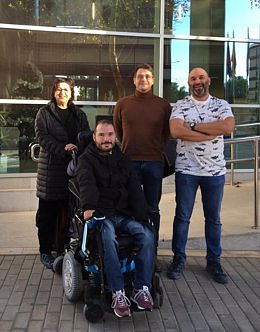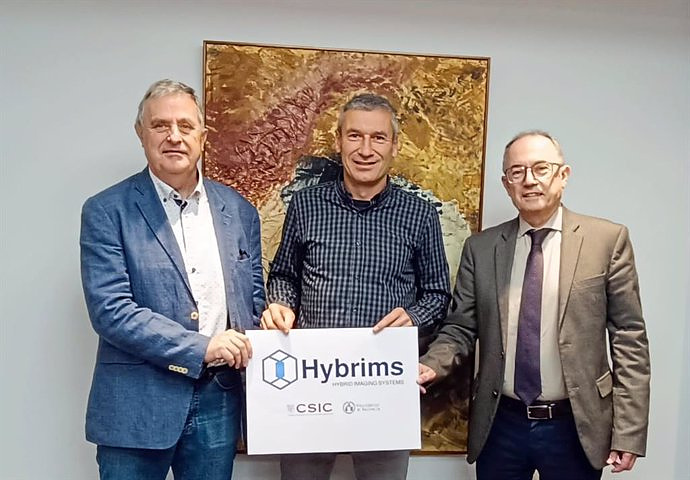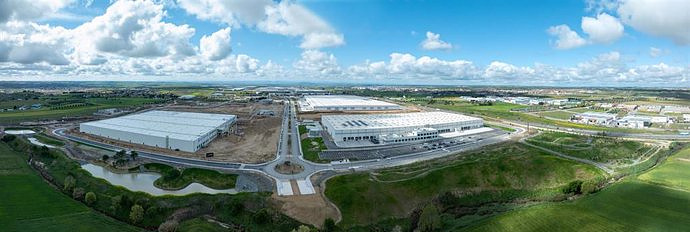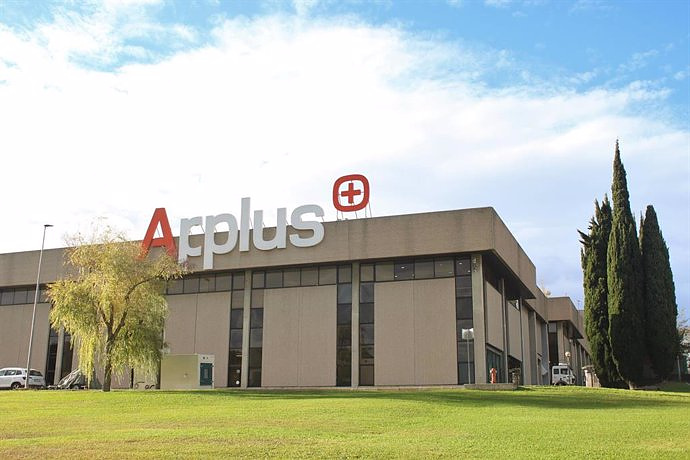VALENCIA, 26 Jan. (EUROPA PRESS) -
A research group from the University of Valencia - made up of Carmen Armero, Francisco Palmí and Gabriel Calvo, from the Department of Statistics and Operational Research of the University of Valencia; and by Virgilio Gómez Rubio, from the Department of Mathematics of the University of Castilla-La Mancha-- participates in the 'Bertha' project, which aims to develop a scalable and probabilistic driver behavior model that will be key to achieving safer and more autonomous vehicles. with behavior similar to that of humans, thus increasing their social acceptance.
The group from the University of Valencia (UV) will be in charge of designing the part of the driver's behavior model using the calculation of probabilities, the academic institution reports in a statement.
Essentially, the probabilistic model will take into account the characteristics of the drivers (such as age, sex, years of driving, etc.), the environment (weather, traffic density, etc.) and other relevant variables to model. the way of driving.
The tool used will be Bayesian networks because they allow establishing dependency relationships between the different variables and determining the response during driving based on their characteristics. In this way, different driver profiles will be established (for example, very aggressive or very cautious) and the probabilities of responding in one way or another to maneuvers while driving will be modeled. These profiles can be incorporated into simulators to develop driving environments that are much more similar to reality than those that currently exist.
The results of the project will be available to academia and industry through an open source data hub and will also be implemented in 'Carla', an open source autonomous driving simulator.
The Horizon Europe Bertha project started at the end of 2023 in Valencia and has received 7,981,799.50 euros from the European Commission to develop this driving behavior model.
The need for a driver behavior model in the Connected, Cooperative and Automated Mobility industry presents important opportunities for the European Union. However, its deployment requires new tools that allow the design and analysis of autonomous vehicle components, along with their digital validation, and a common language between suppliers and manufacturers.
One of the deficiencies appears due to the lack of a validated and scientifically based driver behavior model that covers aspects of human driving performance, which allows understanding and testing the interaction of connected autonomous vehicles (CAB) with other cars. a safer and more predictable way from a human perspective.
Therefore, the model now being worked on could guarantee the digital validation of the components of autonomous vehicles and, if incorporated into the ECU software (United Engine Control, the 'brain' of a vehicle), it could generate a more humane response of these vehicles, thus increasing their acceptance.
To meet this need, the Bertha project will develop this driver behavior model (DBM) based mainly on Bayesian Networks.
Bertha will also develop a methodology that will share the model with the scientific community to facilitate its growth. Furthermore, its results will include a set of interrelated demonstrators to show the DBM approach as a reference for designing human-like, easily predictable and acceptable behavior of automated driving functions in mixed traffic scenarios.
The Bertha Project consortium is made up of 14 partners from 6 different countries, coordinated by the Institute of Biomechanics of Valencia (IBV).
The partners of this project are the Universitat de València (ES), the Vedecom Institute (FR), Université Gustave Eiffel (FR), German Research Center for Artificial Intelligence (DE), Computer Vision Center (ES), Altran Deutschland (DE) , Continental automotive France (FR), CIDAUT Foundation (ES), Austrian Institute of Technology (AT), Europcar International (FR), FI Group (PT), Panasonic automotive Systems Europe (DE) and the Korea Transport Institute (KOTI).

 Exploring Cardano: Inner Workings and Advantages of this Cryptocurrency
Exploring Cardano: Inner Workings and Advantages of this Cryptocurrency Seville.- Economy.- Innova.- STSA inaugurates its new painting and sealing hangar in San Pablo, for 18 million
Seville.- Economy.- Innova.- STSA inaugurates its new painting and sealing hangar in San Pablo, for 18 million Innova.- More than 300 volunteers join the Andalucía Compromiso Digital network in one month to facilitate access to ICT
Innova.- More than 300 volunteers join the Andalucía Compromiso Digital network in one month to facilitate access to ICT Innova.-AMP.- Ayesa acquires 51% of Sadiel, which will create new technological engineering products and expand markets
Innova.-AMP.- Ayesa acquires 51% of Sadiel, which will create new technological engineering products and expand markets Dortmund storms Paris and reaches the final
Dortmund storms Paris and reaches the final Cos bids farewell to Congress warning that the lack of political consensus "affects economic prospects"
Cos bids farewell to Congress warning that the lack of political consensus "affects economic prospects" Two workers died and one injured when two floors collapsed in a building under construction in Fuencarral
Two workers died and one injured when two floors collapsed in a building under construction in Fuencarral The Government will wait until after the European elections to propose measures on democratic regeneration
The Government will wait until after the European elections to propose measures on democratic regeneration How Blockchain in being used to shape the future
How Blockchain in being used to shape the future Not just BTC and ETH: Here Are Some More Interesting Coins Worth Focusing on
Not just BTC and ETH: Here Are Some More Interesting Coins Worth Focusing on They develop devices for the precise diagnosis of cancer patients
They develop devices for the precise diagnosis of cancer patients UMH researchers are working on a high-quality apricot crop that requires less irrigation water
UMH researchers are working on a high-quality apricot crop that requires less irrigation water The UPV develops an application to improve the quality of life of patients with glioblastoma
The UPV develops an application to improve the quality of life of patients with glioblastoma A sensor system obtains the fingerprint of essential oils and detects if they have been adulterated
A sensor system obtains the fingerprint of essential oils and detects if they have been adulterated A million people demonstrate in France against Macron's pension reform
A million people demonstrate in France against Macron's pension reform Russia launches several missiles against "critical infrastructure" in the city of Zaporizhia
Russia launches several missiles against "critical infrastructure" in the city of Zaporizhia A "procession" remembers the dead of the Calabria shipwreck as bodies continue to wash up on the shore
A "procession" remembers the dead of the Calabria shipwreck as bodies continue to wash up on the shore Prison sentences handed down for three prominent Hong Kong pro-democracy activists
Prison sentences handed down for three prominent Hong Kong pro-democracy activists ETH continues to leave trading platforms, Ethereum balance on exchanges lowest in 3 years
ETH continues to leave trading platforms, Ethereum balance on exchanges lowest in 3 years Investors invest $450 million in Consensys, Ethereum incubator now valued at $7 billion
Investors invest $450 million in Consensys, Ethereum incubator now valued at $7 billion Alchemy Integrates Ethereum L2 Product Starknet to Enhance Web3 Scalability at a Price 100x Lower Than L1 Fees
Alchemy Integrates Ethereum L2 Product Starknet to Enhance Web3 Scalability at a Price 100x Lower Than L1 Fees Mining Report: Bitcoin's Electricity Consumption Declines by 25% in Q1 2022
Mining Report: Bitcoin's Electricity Consumption Declines by 25% in Q1 2022 Oil-to-Bitcoin Mining Firm Crusoe Energy Systems Raised $505 Million
Oil-to-Bitcoin Mining Firm Crusoe Energy Systems Raised $505 Million Microbt reveals the latest Bitcoin mining rigs -- Machines produce up to 126 TH/s with custom 5nm chip design
Microbt reveals the latest Bitcoin mining rigs -- Machines produce up to 126 TH/s with custom 5nm chip design Bitcoin's Mining Difficulty Hits a Lifetime High, With More Than 90% of BTC Supply Issued
Bitcoin's Mining Difficulty Hits a Lifetime High, With More Than 90% of BTC Supply Issued The Biggest Movers are Near, EOS, and RUNE during Friday's Selloff
The Biggest Movers are Near, EOS, and RUNE during Friday's Selloff Global Markets Spooked by a Hawkish Fed and Covid, Stocks and Crypto Gain After Musk Buys Twitter
Global Markets Spooked by a Hawkish Fed and Covid, Stocks and Crypto Gain After Musk Buys Twitter Bitso to offset carbon emissions from the Trading Platform's ERC20, ETH, and BTC Transactions
Bitso to offset carbon emissions from the Trading Platform's ERC20, ETH, and BTC Transactions Draftkings Announces 2022 College Hoops NFT Selection for March Madness
Draftkings Announces 2022 College Hoops NFT Selection for March Madness
























